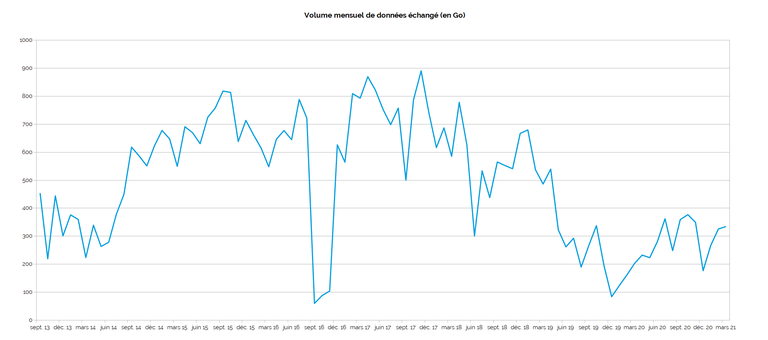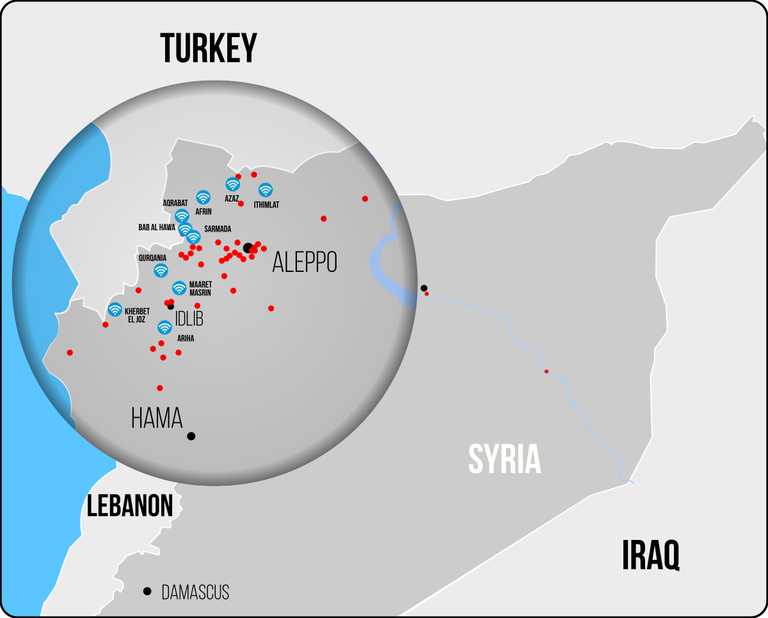Syrian Crisis
Context: Conflict
Start date: 19/03/2012
End date: Ongoing
Areas of intervention: Northern Syria
Activities: Connectivity for humanitarian actors
4,09 TB of medical data transferred in 2019
43,12 TB transferred since 2012
59 medical centres assisted since 2012
3.5 millon patients treated in centres connected by TSF since the beginning of the war
Context
In March 2011, Syria was overtaken by the "Arab Spring" protest movement of which had previously shaken the Maghreb and Middle East regimes for some months. The government’s armed response, followed by the militarisation of the revolution, degenerated into a violent conflict for which no solution has been found so far. The direct intervention of foreign powers and militias has made the situation extremely complex.
From the beginning of the conflict, civilians have suffered the full brunt of the instability and living conditions have become increasingly inhumane. The destruction has affected the country’s entire civilian and community infrastructure, generating mass displacement of populations.
UNHCR (2023) estimates that there are 6.8 million internally displaced civilians in Syria, and more than 5.28 million Syrians who have fled to refugee camps in neighbouring countries such as Iraq, Lebanon, Jordan, Egypt, and Turkey. Overall, more than 15 million of people are in need of humanitarian and protection assistance in Syria.
In 2012, Télécoms Sans Frontières committed to supporting the medical sector with 15 satellite lines and 9 broadband connections in various hospitals across Syria. A year later, TSF strengthened its support by also intervening in the educational field for displaced children inside Syria or refugees in neighbouring Turkey.
Connectivity for medical centres
Since the beginning of its intervention in 2012, TSF has connected 53 hospitals, clinics, pharmacies and medical coordination centres, and has made available more than 20 satellite lines for the repatriation of wounded people.

These connections are vital for medical organisation, enabling them to:
- Guide and transport the victims;
- Communicate needs and equipment in hospitals;
- Provide the statistical data of the wounded.
Medical centres and hospitals are places of high risk and often targets of bombing. Their location also depends on the position of the front lines. TSF conducts daily monitoring of the state of the connections, and alongside its partners on the ground, ensures the relocation or installation of new equipment if needed. Since the beginning of the war, more than 30 antennas have been moved or replaced by TSF.

The internet connections in medical centres are used in particular for the following operations:
- Remote consultations;
- Syrian doctors can exchange with their colleagues and receive expertise from around the world;
- The remote monitoring enables management of many services such as resuscitation and intensive care;
- Medical centres can coordinate with each other, and manage their inventory and supply of drugs and equipment.
Mobile rescue teams
In order to contribute to the coordination between mobile medical teams and hospital-based doctors, TSF provides staff from the Union of Syrian Medical Care and Relief Organisation (UOSSM) with satellite communication equipment to enable the supervision of ambulances and provide immediate assistance to civilian victims.
A fleet of satellite lines allows 10 mobile clinics operating in the Idlib region to be in permanent contact with the coordination centre which can dispatch ambulances, assessment teams, or alert the security department.
The types of information exchanged include:
- Situation reports;
- Early warning following an incident;
- Risk management;
- Sending instructions.
Our partners estimate that around 80,000 people have been transported by ambulance thanks to teams connected by TSF. Among them, some require care in hospitals located in bordering countries such as Lebanon and Turkey.
Testimonies
"The internet connection is an absolute necessity in our daily work. It allows us, for example, to make remote medical consultations, to send our needs in terms of medicine and equipment to the warehouse that provides us, but also to contact our colleagues in Bab-Al-Hawa or Gaziantep (Turkey), and manage communication between field teams and the hospital." - Dr. Abdullah Al Ibrahim, paediatrician at Ariha Hospital
“Here one call saves lives. […] While local internet service providers are available, their connections face regular disconnections. That makes TSF connection very important, because it is safe from being disconnected or blocked by service providers.” – Mr. Mohammad Hawarie, Safety and Security Assistant at the Union of Medical Care and Relief Organizations (UOSSM)




























